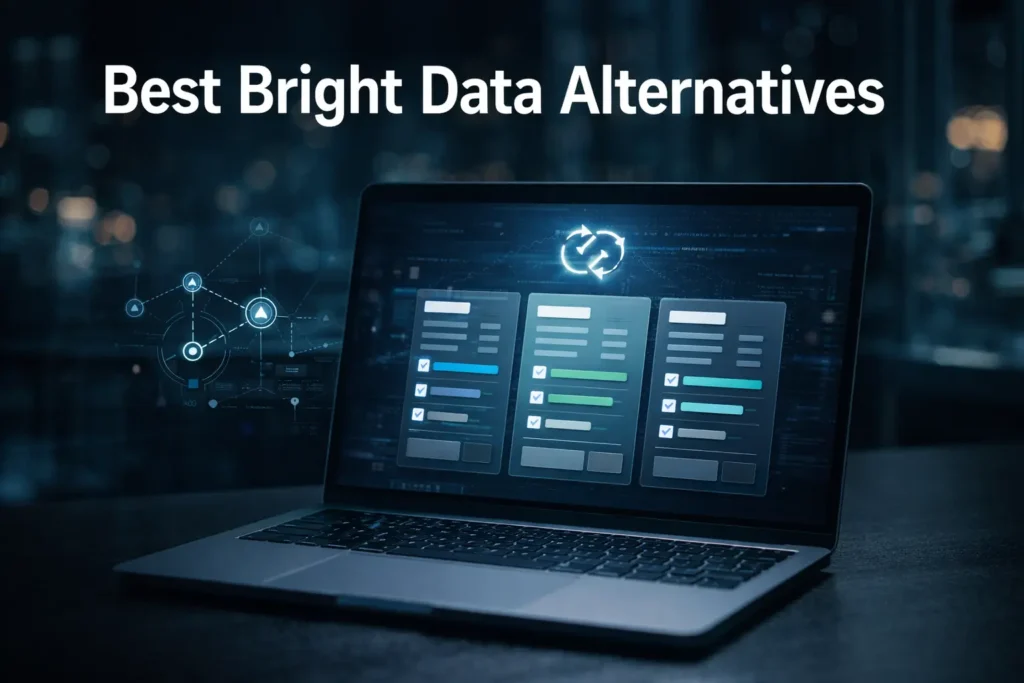Proxies are powerful tools for protecting your privacy online, but here’s what free proxy providers don’t advertise: 79% of free proxy servers operate without HTTPS encryption, meaning every password you enter, every credit card number you submit, and every piece of personal data you send is completely visible to anyone monitoring the connection. Understanding the risks of using free proxies could be the difference between staying secure and becoming the next data breach victim.
If you aren’t already familiar, proxies function as the middleman between you and the rest of the internet. They’ll hide your IP address for you, which normally carries information about your device and location. By replacing your IP address, any data that third parties manage to collect about you is a few more steps removed from your real identity.
The importance of maintaining confidentiality in the modern age is fairly self-evident. However, the benefits of using proxies go beyond just that. On top of anonymity protecting your identity, select proxies will make it appear like you’re in a different part of the world entirely. Any bot you run online, such as for web scraping, will also likely require proxies so it isn’t immediately blocked.
Issues With Free Proxies
Table of Contents
ToggleThere are plenty of free web proxies out there, boasting a wide selection of countries to choose from. The only thing they ask for is that you enter the website you’re looking for, and they’ll take care of the rest. If you think that’s too good to be true… That’s because it is!
The cost of free proxies is often hidden in the form of compromised privacy, intrusive ads, and potential exposure to phishing scams.
Source: TechRadar. (2023). Why you should avoid free proxy servers.
Let’s go over seven of the risks of using free proxies and explain how they contrast with what a reliable paid proxy server like KocerRoxy provides instead.
Also read: The Benefits of Using a Proxy Server
Lack of Customization
With free web proxies, you have no control over any settings.
| Setting/Feature | Free Proxies | Paid Proxies |
|---|---|---|
| IP Rotation Control | ❌ None | ✅ Customizable |
| Geographic Location Selection | ❌ Random/Limited | ✅ Choose Country/City/State |
| Connection Protocol | ❌ No Choice | ✅ HTTP/HTTPS/SOCKS5 |
| Session Duration | ❌ Unpredictable | ✅ Sticky Sessions Available |
| Bandwidth Control | ❌ Shared/Limited | ✅ Dedicated/Unlimited Options |
| Port Configuration | ❌ Fixed | ✅ Custom Port Selection |
| Refresh/Retry Rates | ❌ Not Adjustable | ✅ Fully Configurable |
| Whitelist IP Addresses | ❌ Not Available | ✅ Full Control |
| API Access | ❌ None | ✅ Full API Integration |
| User Authentication | ❌ Minimal/None | ✅ Username/Password Protected |
| Connection Timeout Settings | ❌ Preset | ✅ Customizable |
| Usage Dashboard/Analytics | ❌ None | ✅ Real-Time Monitoring |
Meanwhile, well-designed proxy servers can provide fine-tuned options for many things. Some examples of features of select paid proxy servers are: adjusting rotating IP addresses, refresh rates, which ports to use, global position, and more.
Also read: Top 5 Best Rotating Residential Proxies
Unreliable Availability
At any time, the owner may shut off the service, as they have no obligations to you. Even while they’re still online, their stability is shaky at best.
A reliable proxy server, however, will maintain consistent service with no risk of freezing and little to no downtime. Quality proxy servers will commit to 99% uptime and mean it.
Also read: The Risks of Digital Fingerprinting
Poor Response Speeds
Anything high-speed would never be available for free. They will have middling quality at best. Then, they might get overwhelmed with requests from numerous people simultaneously. This could lead to even worse speeds, or the service could completely freeze.
Conversely, high-caliber paid proxy services will have dependably high speed at all times.
Also read: The Importance of Web Scraping
Low Security
The overwhelming majority of free web proxies don’t allow HTTPS connections. What that means is that the connection between the proxy and yourself is not encrypted.
A likely reason for this is that they may wish to monitor your connection themselves. They could easily do this by using their service as a honeypot to coax you into letting them access your device.
At least when a SOCKS connection doesn’t encrypt your data, it is more flexible in what traffic it can handle while being significantly faster.
Of course, paid proxy servers will offer you multiple protocol options on their premium services, so you can choose what is best for your needs.
Also read: Top 5 Best SOCKS5 Proxies
Data Theft
As briefly mentioned above, they may be abusing the open connection with your device to glean valuable information from you. Using their service is an act of trust on your part that they aren’t going to exploit this possibility.
Similarly, they may snatch your cookies. The digital ones, at least. Your chocolate chip cookies are safe for now.
Digital cookies store your login information when you visit sites, so you don’t have to enter those credentials again every time you go there. By being in between you and the site you’re accessing, the free web proxy can sneak a copy for themselves while those cookies are being virtually baked.
Depending on what websites you visit during your session through the free web proxy, they could get some vital information. Examples would be login credentials for things like your job, social media accounts, or even banking information. Why would they need to ask for your credit card information when they can just take it for themselves?
Needless to say, no reasonable paid proxy service would unrightfully take your sensitive data. They wouldn’t stay reputable for very long if they did, that’s for sure.
Also read: Why Social Media Is Important for Businesses?
Presence of Malware
Free web proxies can easily infect your device while they have trusted access to it. There is no guarantee that their servers are clean. Just like they could directly steal some of your information while you use their service, they can plant malicious code to grab the rest.
It might not even be intentional on their part, either.
To support being a ‘free’ service, they may rely on ad revenue to generate income. They’ll inject their ads right into the content you’re shown, trying to coax you into clicking on them. However, malware authors sometimes use ads to promote their programs. Thus, they exploit websites with lax ad checks to spread them far and wide.
No sensible paid proxy server would dare do such things.
Also read: Blocked Rotating Residential Proxies? Here’s How to Get Back on Track
Lack Of Customer Service
While free web proxies lack customization, that doesn’t mean you won’t have any questions. And even if they were to attempt to provide any customer service, they’d likely be bogged down with all of the complaints about the lackluster quality of their connections.
Conversely, quality paid proxy server providers will offer comprehensive FAQs and email support, and top-of-the-line ones will even have 24-7 chat support.
Also read: The Future of Ad Verification: AI’s Impact on Brand Safety
Conclusion
After seeing the comparisons between free web proxies and paid proxy servers, it should be clear what the real costs of so-called free services are. Despite not paying upfront money, the lower quality and risks of malware infection or even sensitive information theft make them expensive in their own way.
The difference is even harsher when you take into account that premium services exist in affordable price ranges. Now that you’re armed with this information, there is no reason to subject yourself to the risks of using free proxies.
FAQs
Q1. Why do free proxies never work?
Free proxies are often oversubscribed, with many users sharing the same IP addresses. This can lead to slow performance, frequent downtime, and inconsistent connectivity. They may not provide the reliability needed for tasks like web scraping or accessing restricted content.
Bad actors may operate free proxies to collect sensitive information or inject malicious content. Since free proxies lack strong security measures, your data can be at risk. Using these proxies might expose personal information or credentials to malicious third parties.
Websites and online services often detect and block free proxies because they are commonly used for abusive purposes. Many websites have mechanisms to identify and block IPs associated with free proxy services, making them ineffective for bypassing restrictions or performing web scraping.
Free proxies usually come with no customer support or maintenance. If issues arise, you may not get any assistance or solutions. Paid proxies, in contrast, often come with customer support and regular maintenance, ensuring better performance and reliability.
Free proxies generally offer limited features and do not support advanced functionalities like proxy rotation or specific IP types (e.g., residential IPs). This can limit their effectiveness for tasks requiring more sophisticated configurations.
Q2. What are the dangers of a free proxy?
Free proxy servers often lack robust security measures. They might not encrypt your data effectively, leaving your personal information vulnerable to interception by malicious actors. This can lead to data breaches or unauthorized access to sensitive information.
Many free proxy servers do not guarantee privacy. Some may log your browsing activities or even sell your data to third parties. Since free proxy servers don’t usually offer transparency or data protection policies, your personal information could be at risk of misuse.
Free proxy servers often suffer from high latency, slow speeds, and frequent disconnections due to heavy usage by multiple users. This can disrupt your browsing experience or impair the effectiveness of web scraping and other automated tasks.
Some free proxy servers may inject ads or malicious code into the web pages you visit. This can lead to malware infections, compromising your device’s security and potentially causing data loss or damage.
Using free proxy servers for illegal activities, such as circumventing geo-restrictions or scraping websites without permission, can have legal consequences. Additionally, some free proxies may engage in unethical practices, such as data harvesting or unauthorized data access.
Q3. Can you get in trouble for using a free proxy?
Many free proxies use unencrypted HTTP connections instead of HTTPS. This means that your data is transmitted in plain text, making it vulnerable to interception by hackers or malicious actors. Sensitive information, such as login credentials or personal data, can be easily compromised.
Using free proxies to bypass geo-restrictions or perform activities that violate the terms of service of a website can result in legal trouble. Websites often have policies against scraping, unauthorized access, or circumvention of their access controls.
Bad actors frequently use free proxies to carry out fraudulent activities. If you use a free proxy, you might inadvertently become involved in such activities, leading to potential legal consequences or damage to your reputation.
Q4. Are free proxies safe to use?
No, free proxies pose significant security risks. Most lack HTTPS encryption, exposing your data to interception. They may steal login credentials, banking information, and cookies. Free proxies can also inject malware into your device and sell your browsing data to third parties without consent.
Q5. Why are free proxies so slow?
Free proxies suffer from poor speeds because they use low-quality infrastructure and become overloaded with simultaneous users. They lack dedicated resources and often experience complete freezing or downtime. These services have no obligation to maintain performance standards or consistent uptime.
How useful was this post?
Click on a star to rate it!
Average rating 0 / 5. Vote count: 0
No votes so far! Be the first to rate this post.
Tell Us More!
Let us improve this post!
Tell us how we can improve this post?


